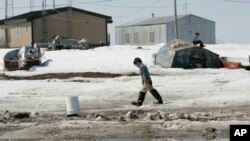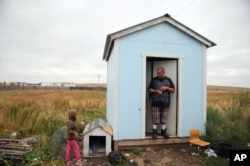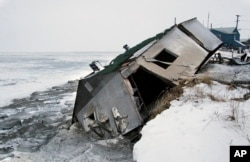U.S. Native Americans are expressing alarm over President Donald Trump's proposed 2018 federal budget, which calls for across-the-board spending cuts to agencies and programs that provide them with critical services.
- The Department of the Interior (DOI), which houses the Bureau of Indian Affairs, faces a nearly 11 percent budget reduction.
- The Bureau of Indian Affairs faces cuts of more than $300 million.
- The Department of Housing and Urban Development, or HUD, would see spending trimmed by 13.2 percent.
- The Environmental Protection Agency (EPA) budget would decrease by 31.4 percent.
- The Department of Health and Human Services, which houses the Indian Health Service, would be trimmed by 16.2 percent.
- The Department of Education would lose 13.5 percent in funding.
An estimated 2.2 million people in Native American and Alaska Native communities, or NA/ANs, would be affected by proposed cuts in health care spending.
Compared to the overall population, they face chronic disparities in health and health care, suffering high rates of diabetes, heart disease, depression and alcoholism.
Treaties and laws require the government to provide certain protections, rights and services to NA/ANs, including health care.
The chronically underfunded Indian Health Service (IHS) offers care through a network of hospitals, clinics and health stations managed by IHS, tribes or tribal organizations, and urban Indian health programs. If the proposed budget passes, Medicaid, the national and state program that covers low-income individuals, could see its budget cut by $610 billion over the next 10 years. Mark Trahant, a journalist, academic and member of the Shoshone-Bannock tribes who has covered NA/AN affairs for 30 years, is concerned.
"In Indian Country, more than half of all Indian kids who go through Indian Health Service have their insurance through Medicaid," he said. "Thirteen percent of Medicaid is Indian care."
The budget would eliminate programs like the Low-Income Home Energy Assistance Program, which helps low-income households pay to heat or cool their homes. In 2016, 150 tribal groups and more than 43,000 Native households received LIHEAP funds.
"So, any kind of programs for folks to get subsidies to live in homes would go away," said Trahant. "There’s just not any private sector housing on reservations, so that would be a big problem."
Alaska Natives are particularly troubled by the proposed elimination of the Denali Commission. The small federal agency coordinates state-federal infrastructure projects that include providing water and sewer systems to remote villages and moving the village of Newtok, threatened by ongoing erosion and melting permafrost, due to warmer temperatures.
Also slated to be cut is the Essential Air Service, an annual federal subsidy program that supports commercial air service in remote areas across Alaska. In all, more than 60 communities would be impacted.
"If you live in a village where air service is not only the route out for travel but your route in for goods and services, you’re really sunk," Trahant said.
Other programs aimed at supporting housing assistance, business development and energy weatherization face possible elimination.
Tribal leaders say the budget ignores federal obligations to NA/AN's.
"The cutbacks to tribal programs are cutting into the bone and fail to recognize very real and critically important needs," Fawn Sharp, the president of the Affiliated Tribes of Northwest Indians, said Tuesday at a tribal conference in Portland, Oregon. "It is so severe that it's absolutely illogical and unreasonable."
Lawmakers from states with significant Native American populations have also expressed concern. They include New Mexico Democrat Tom Udall, vice chairman of the Senate Committee on Indian Affairs.
"President Trump's budget proposal for programs affecting Indian Country is extremely troubling because of its disregard for the federal government's responsibilities and its troubling lack of understanding of the challenges facing Tribal communities," Udall said Tuesday in a statement.
New Mexico is home to 23 federally recognized tribes and about 220,000 Native American citizens, a third of whom live below the poverty line.
Others voicing disappointment with the new administration's proposal include Oklahoma Republican Congressman Tom Cole, a citizen of the Chickasaw Nation, one of more than three dozen tribes in that state.
During a House subcommittee hearing on the budget for the Indian Health Service Wednesday, Cole pledged to work to "reverse the numbers."
"Whether the administration knows it or not, this budget reflects that it doesn’t care very much about Indian health care," he said.
Trahant said he isn’t too concerned, adding that releasing the budget is only the first step in what could end up being a lengthy process. It’s now up to Congress to rework the budget, the journalist said, advising concerned groups to focus on Capitol Hill, not the White House.
NOTE: This story has been updated to correct a statistic about Native Americans and Medicaid.







